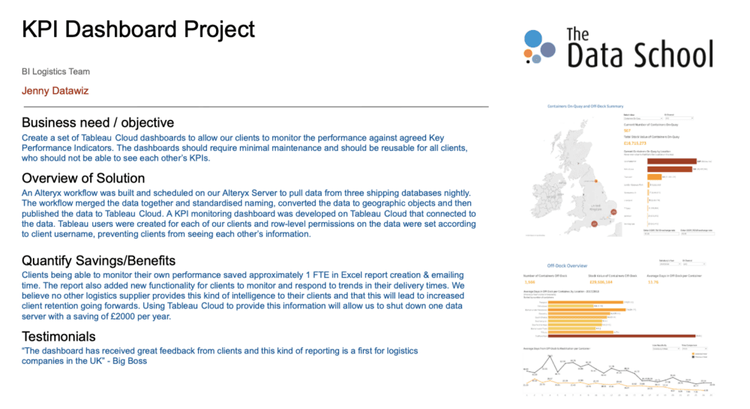
It’s the part of the data engineering or dashboard building process that often gets forgotten: writing up your latest project and attributing a value to it to your organisation. The process of reflecting on and quantifying your work is where the real benefit to the organisation and also to you as an analyst is shown. Let’s delve into why quantifying your work is not just a best practice but a fundamental necessity.
What is quantifying your work?
Putting a value to the last data pipeline you built, or the last report you built for the marketing team. It’s the last, but very important, piece of the job as a data analyst or BI developer. As a manager you’ll want to provide your team the opportunity to really understand how what they’ve built has benefitted them and the wider business.
Typically, writing up your latest project involves:
Writing up the problem. What did your project aim to solve? What business question was it answering? What was available before for people? Was it a cumbersome spreadsheet that needed updating weekly? Was it a painful slide deck that needed graphs pasting in? Was it messy and unstructured data that existed in disparate places?
Explaining what you built and the process. Keep it brief and not too technical. Stakeholders need to easily understand you.
Describe who the output is for and how they’re using it. Does it get put on the screen at every team meeting? Is it emailed to someone every day?
Demonstrate value. Is your project enabling new insights? Has it meant decisions are made quicker? Has it led to new business? How much time has it saved? Can you equate that to an FTE? Where possible, try and attribute the real pound/dollar impact of your work.
And lastly, what could have been better? Are there any follow-up pieces of work or improvements to consider?

How does quantifying your work benefit you and your development?
The reflective part of a project is where our learnings get embedded and understood. It allows us to see what went really well and what we can improve on next time. Having these pieces of reflection also help support you in your appraisals, discussions with managers/seniors and can also help you progress in your career. Because now you can really explain your impact to the business.
How does it benefit your organisation?
Quantified work in data analytics identifies opportunities for optimisation. By tracking metrics over time, you can pinpoint areas where improvements are needed. For instance, you might notice that data collection time has increased, signalling a need to streamline data acquisition processes.
Quantifying each project helps with scalability and resource allocation. Knowing the time, personnel, and infrastructure required for different projects enables better resource allocation and project planning. It ensures that your team operates efficiently, meeting deadlines and delivering value.
Quantifying your work enhances precision, measures impact, supports performance evaluation, identifies optimisation opportunities, and provides valuable decision support. Moreover, it fosters continuous skill development, aids in resource allocation, and builds stakeholder confidence. Embrace the power of quantifying your work.
Feature image credits: www.zuko.io
